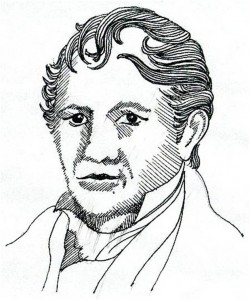 Eli Whitney, who was born December 8, 1765 in Westboro, Massachusetts, had a very inventive mind. At the age of 14, he manufactured nails for profit from a workshop on his father’s farm. After graduating from Yale College in 1792 he moved to South Carolina. At that time, slaves spent hours plucking seeds from cotton bolls by hand. Whitney got the idea for a machine that could do the work while he watched a cat trying to catch a chicken and pull it through a fence. Only the feathers passed through. His invention separated cotton fibers from the seeds, doing the work of 50 slaves.
Eli Whitney, who was born December 8, 1765 in Westboro, Massachusetts, had a very inventive mind. At the age of 14, he manufactured nails for profit from a workshop on his father’s farm. After graduating from Yale College in 1792 he moved to South Carolina. At that time, slaves spent hours plucking seeds from cotton bolls by hand. Whitney got the idea for a machine that could do the work while he watched a cat trying to catch a chicken and pull it through a fence. Only the feathers passed through. His invention separated cotton fibers from the seeds, doing the work of 50 slaves.
Some believe that Whitney hoped his invention would make slavery obsolete since now a machine could do the work. Instead, the cotton gin streamlined production, increasing the market for inexpensive cloth. Cotton became a major economic crop throughout the South, requiring more slaves to keep up with demand. Unscrupulous men copied Whitney’s machine. Unable to defend his patent until 1807, he nearly declared bankruptcy, but the cotton gin made Whitney’s name famous.
In 1798, Whitney obtained a contract to supply the United States military with 10,000 muskets and invented a way to manufacture the guns with interchangeable parts. It was this invention that made Whitney wealthy.
Eli Whitney’s nephews, Eli and Philos Blake, inherited their uncle’s armory. The younger Blake, under contract to Samuel Colt, manufactured Whitneyville Walker Colt revolvers for the Texas Rangers.



